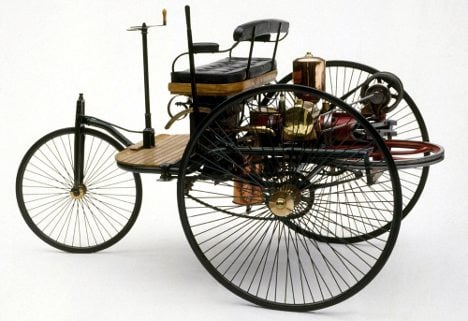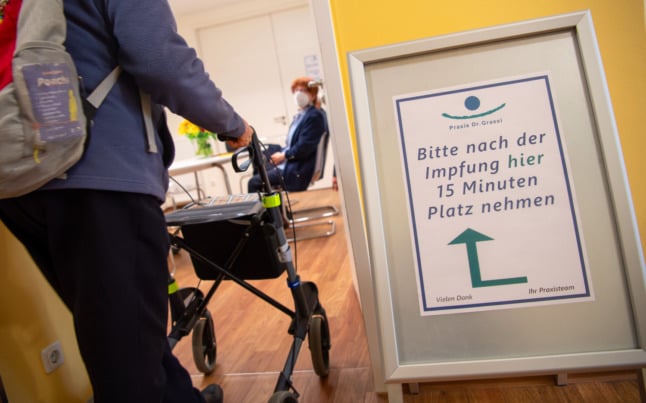Gear heads the world over are preparing to mark an important milestone for the automobile – it’s been exactly 125 years since the first car took to the streets of what is now the German state of Baden-Württemberg.
Still home to much of Germany’s automotive industry today, 125 days of events are planned for what’s been dubbed “Automobile Summer 2011.” The series revs up on May 7, at Stuttgart’s Schlossplatz, opening the gates to festivities all over the county that will celebrate the past, present and future of the car.
Carl Benz received a patent for his Motorwagen in 1886, powered by his own four-stroke combustion engine. Resembling a giant tricycle, his contraption had three wheels. A 954cc single cylinder, petrol engine provided just 0.75 horse power that maxed out at a top speed of some 16 kilometres per hour.
Click here for a photo gallery of the Automobile Summer 2011
But Benz was not the only German visionary in his field; he simply beat the others to the patent. While Benz worked in Mannheim, Gottlieb Daimler and Wilhelm Maybach were hard at work in Bad Cannstatt outside Stuttgart. Daimler patented an engine with a single vertical cylinder, which became the first small, high-speed combustion engine. In 1887, he customised a horse-drawn carriage into a motorized vehicle and Daimler became the first person ever to apply for a driving permit in 1888.
At the 1889 world’s fair in Paris, Daimler’s company debuted a more powerful two-cylinder engine for its “Quadricycle”. Daimler’s business prowess, however, was not on par with his inventive side, and the company struggled until his death a year later in 1900. Despite their similar passions and pursuits, Daimler and Benz never met, but their companies did merge in 1926 to form Daimler-Benz AG, which is now known just as Daimler after an ill-fated merger with America’s Chrysler.
In 1931, another legendary carmaker jumped into the race, with the founding of Ferdinand Porsche’s firm in Stuttgart. Early projects for Porsche included the creation of a “people’s car” – or Volkswagen – during the Third Reich, as well as a racing programme that helped foster Germany’s high-speed automotive industry. Today, the name Porsche is a symbol of luxury and speed.
Stuttgart is still home to Mercedes-Benz and Porsche, so it seems only fitting that the summer celebrations should begin there. At Schlossplatz this weekend, visitors can enjoy a programme including a technology and innovation exhibition, Stuttgart’s search for the supercar, and a car birthday parade.
Rather than focusing on the past, the exhibition will offer a glimpse at the future of transportation. Stands will include electrical mobility, alternative propulsion techniques, prototypes as well as historical vehicles.
Then there’s the vote for what visitors think is the nation’s supercar. Germans and foreigners alike have entered a public competition to show off their treasured vehicles in an attempt to win the title of “Super Auto.” Five hundred car aficionados applied, and 125 of the most-interesting candidates’ cars will be on display on Saturday, May 7.
The weekend’s highlight, however, will surely be the parade of 125 years of automotive history. Historic and contemporary cars from Mercedes-Benz, Porsche and Audi, driven by prominent personalities, will start at the Porsche Museum, go past the Mercedes-Benz Museum and arrive at the Schlossplatz at approximately 2 pm on Sunday, May 8. It is the first car parade of its kind.
Coinciding with Legends 125 in Stuttgart is an open-air car show, called “S-town centre Mobil,” which will highlight 20 brands and more than 170 new vehicles. For more information, visit the Messe-Stuttgart website.
But this weekend is just the start of Automobile Summer 2011, which aims to be entertaining for the whole family.
“Nowadays, nearly everybody has their own car. Some like vintage cars, others the latest sports model,” said Anja Bühler, of tourism marketing for Baden-Württemberg. “All the events of Automobile Summer combine automobile history with the present and also the future of the car. And they offer memorable experiences for everybody.”
Throughout the summer, cities and towns around Baden-Württemberg will host nearly 400 automotive-themed events. Highlights include:
June 2 onwards Mobile diversity at Lake Constance
Visitors can appreciate all the ways in which the automobile affects transport today. The events begin on June 2, with classic cars on display at the “Klassikwelt Bodensee” trade fair and other attractions organised by the “Oldtimerland Bodensee” club. The Zeppelin will be on display, and sightseeing flights will be available. Modern, environmentally friendly ships will offer cruises on the lake alongside historic steamships and restored ferries. From July 1 onwards, vehicles will take to both land and water at the International Amphibious Crafts meeting.
June 17-19 Big Birthday Party, Karlsruhe
This weekend of festivities in Benz’ birthplace offers four different exhibitions as well as a science festival at the Forscherstadt. Exhibitions include “Car culture – Focus on Transport” at the ZKM Centre for Art and Media, “Get going with minerals” at the State Museum of Natural History, “The Beauty of Speed – Future art show” at the Karlsruhe State Art Gallery, and “Carl Benz: an Exhibition on his Life and Times” at the Karlsruhe City Museum.
July 22-24 Solitude Revival, Stuttgart
Motor racing fans can step back in time for a classic car revival and race at one of Germany’s oldest and most famous tracks, Solitude, near Stuttgart. This summer will be the first time cars have run the complete 12.7 km natural course in 46 years. Festivities will also include a tribute parade to Benz, with more than 200 classic road vehicles, dating from 1896 to 2011, taking to the course.
June 24-26 Motorissimo, Pforzheim
Carl Benz’ wife, Bertha Benz, was born in Pforzheim. In 1888, she made the first-ever overland drive from Mannheim to Pforzheim in the three-wheeler, so it seems only fitting to hold a “Motorissimo” here in her honour. More than 140 classic cars will make the same trip from Mannheim to the “Golden City’s” pedestrian area. The weekend will offer music, shows, markets, theme tours and more.
September 10 Autosymphony, Mannheim
Drawing a close to 125 days of events is the world premier of the multi-media “autosymphony” in Mannheim. This specially commissioned “Car Symphony” includes 80 cars “playing” alongside the SWR Symphony Orchestra Baden-Baden and Freiburg, SWR Vocal Ensemble Stuttgart, Pop Academy Baden-Württemberg and Söhne Mannheims Band. The show begins at 8pm on Saturday, September 10, at Friedrichsplatz.



 Please whitelist us to continue reading.
Please whitelist us to continue reading.
Member comments